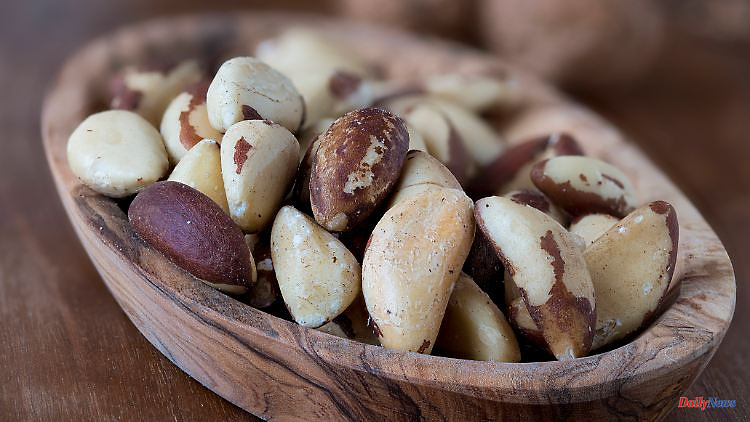Nuts in general and Brazil nuts in particular are considered a healthy snack. They provide a wealth of proteins, vitamins and minerals. The Brazil nut can also score with a high selenium content. Unfortunately, that's not the only thing the nut has to offer.
Like many other types of nuts, Brazil nuts are considered healthy. Because they provide a lot of vegetable protein in addition to a large number of vitamins, minerals and unsaturated fatty acids. That is why they are particularly popular with vegetarians and vegans. In addition, the fruits of the Brazil nut tree, which is native to the Amazon rainforest, offer a lot of selenium. The trace element is important for cell renewal and the immune system, among other things. The daily requirement is covered by just eating two nuts.
That sounds good at first, but the nuts should only be eaten in small portions because they are naturally radioactive, as Öko-Test warns. 21 corresponding products were examined at prices between 2.99 euros and 7.98 euros per 200 grams. 8 of them bear an organic seal.
The contamination of all the nuts examined by radioactive radium is the reason why the overall rating "satisfactory" was awarded at best in this test. And that's only for three products: namely "Farmer's Snack organic Brazil nut natural" for 6.12 euros, "Rapunzel Brazil nut kernels" (7.98 euros) and "Gut
Brazil nuts naturally accumulate significantly more radioactive substances than other foods. Because the often very old trees, up to 60 meters high, have a widely branched root system, through which they absorb substances found in the soil - including radium - in particularly high concentrations.
The average annual natural radiation exposure in Germany is around 2100 microsieverts (µSv) per person. According to the Federal Office for Radiation Protection (BfS), around 300 µSv of this is attributable to our diet every year. According to the authorities, the consumption of two Brazil nuts per day would add 160 µSv and thus a good half more. With radiation exposure at this level, however, no one should expect negative health consequences. At the request of Öko-Test, however, the radiation experts advise feeding selenium via dietary supplements - as a radiation-free alternative.
If you still want to nibble on Brazil nuts, it is better to stick to two pieces a day. As a precaution, pregnant and breastfeeding women should avoid it altogether, the testers advise. That being said, since shelled Brazil nuts are highly susceptible to mold toxins, they should be discarded as soon as they taste bitter or smell musty. In the current test, however, mold toxins were not a problem.
In addition to radium, Brazil nut trees absorb a lot of barium - together with calcium, which is chemically very similar, with which they stabilize their bark. Excess barium can cause high blood pressure in humans and affect kidney function. The testers see nine measured values as "increased", those of the "Clasen Bio Brazil nut kernels" even as "strongly increased" ("insufficient").
The commissioned laboratory, which tested the sensors for the investigation, complained about breakage and bumps in some cases. Five packs attracted negative attention because they contained more rancid, musty or chemical-tasting kernels than a quality standard for Brazil nut kernels tolerates.
Due to a sum of the deficits mentioned, the "Alnatura organic Brazil nut kernels", the "Ener organic Brazil nut kernels" and the "Reformhaus organic Brazil nut kernels" were rated as unsatisfactory.












